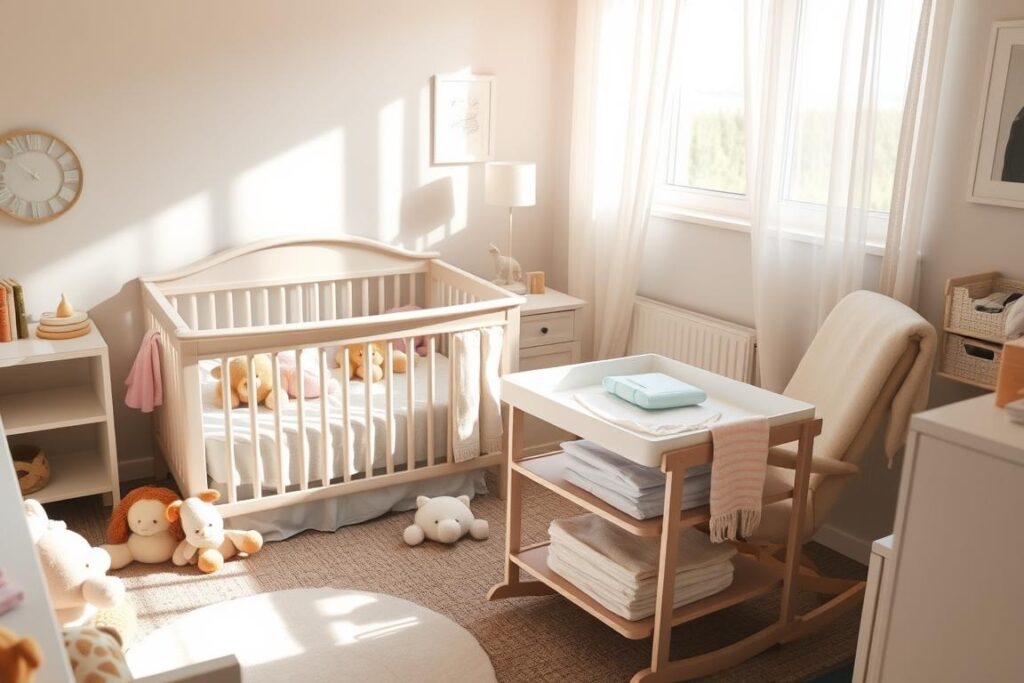Welcoming a newborn is an exciting and life-changing event. However, the shift from pregnancy to parenthood can be overwhelming, especially for first-timers. To make the transition smooth, it’s key to prepare ahead and gather the right knowledge and tools. This guide will give you the vital info and practical tips for the early days of caring for your newborn.
Key Takeaways
- Learn the basics of newborn care, like feeding, sleeping, and health checks.
- Make your home safe for your baby by baby-proofing it.
- Build a strong support network of family, friends, and healthcare experts.
- Find ways to take care of yourself to handle the challenges of new parenthood.
- Get to know your baby’s sleep patterns and set up good sleep habits.
Essential Baby-Proofing Your Home Before Arrival
As parents-to-be, making your home safe for your newborn is key. You’ll need to set up cozy sleeping areas and secure furniture and outlets. These steps will help prepare your nursery and the rest of your home.
Creating Safe Sleeping Spaces
Creating a safe sleep area is vital. Pick a firm, flat mattress and make sure the crib is safe. Don’t use loose bedding, pillows, or soft toys that could be dangerous. Instead, use a tight sheet and a breathable sleep sack or swaddle.
Securing Furniture and Electrical Outlets
It’s important to anchor heavy furniture like dressers and TV stands to the wall. This prevents them from tipping over and hurting your baby. Also, cover all electrical outlets with tamper-resistant covers or safety plugs to keep curious fingers away.
Setting Up a Baby-Friendly Environment
Look for hazards in your home and fix them quickly. This includes installing safety gates at stairs and using locks on cabinets and drawers. Make sure cleaning products and medications are stored safely and out of reach.
By thoroughly baby-proofing your home before your baby arrives, you’ll create a safe space. This will give you peace of mind as you start your parenting journey.
| Baby-Proofing Essentials | Benefits |
|---|---|
| Crib with Firm, Flat Mattress | Reduces risk of SIDS and suffocation |
| Furniture Anchors | Prevents tipping hazards |
| Electrical Outlet Covers | Protects curious fingers from shocks |
| Safety Gates | Restricts access to dangerous areas |
| Cabinet and Drawer Locks | Keeps hazardous items out of reach |
“Childproofing your home is one of the most important things you can do to ensure your baby’s safety. It’s better to be proactive than to have a scare.”
Must-Have Items for Your Newborn’s First Week
Getting ready for your newborn’s arrival can be a lot to handle. But, having the right baby essentials makes those early days easier. This first-week checklist will help you get everything you need for your little one’s homecoming.
Here are the must-have items for your newborn’s first week:
- Onesies, socks, and other comfy clothes
- Diapers (newborn size) and diaper bag must-haves like wipes and cream
- Bottles, formula (if not breastfeeding), and a bottle brush
- Burp cloths, bibs, and a feeding pillow
- Swaddle blankets, a cozy crib or bassinet, and a baby monitor
- Gentle baby soap, shampoo, and a soft washcloth
- A nasal aspirator, thermometer, and baby nail clippers
- Soothing items like a pacifier, white noise machine, and rocking chair
Remember, every baby is different. So, feel free to change this list to fit your needs and likes. With these newborn supplies, you’ll be ready to bond with your baby in those first days.
“The first few weeks with a newborn can be both exhilarating and exhausting. Having the right baby gear ready makes a world of difference.”
Understanding Your Baby’s Sleep Schedule and Patterns
Newborns sleep differently than older kids. It’s key to know their sleep patterns to help them sleep well. This ensures they get the rest they need.
Establishing Healthy Sleep Routines
Start a bedtime routine early. It can be rocking, reading, or a massage. Doing it at the same time every night helps your baby know it’s sleep time.
Managing Night Feedings
Newborns need to eat often, even at night. Keep the room quiet and dimly lit for feedings. Try to keep things calm and avoid exciting activities.
Recognizing Sleep Cues
Watch for signs like yawning or rubbing their eyes. These are sleep cues. Quick action can help your baby sleep better.
Every baby is different, and their sleep needs change as they grow. Paying attention to their sleep patterns helps create a sleep-friendly environment for both you and your baby.
Bringing Home Baby: A Complete Preparation Guide
Bringing a newborn home from the hospital is both exciting and daunting for first-time parents. To make the transition smooth, thorough preparation is key. This guide will help you prepare your home for your baby’s arrival, from packing hospital bags to setting up a care routine.
Packing Your Hospital Bags
Don’t wait until the last minute to pack your hospital bags. Start gathering essential items early, like comfortable clothes and toiletries. Don’t forget to pack a going-home outfit for both you and your baby.
Preparing Your Home
Before your baby comes home, make sure your home is safe and welcoming. Baby-proof your space by securing furniture and covering outlets. Also, create a cozy sleeping area for your baby.
- Childproof your home by installing safety gates and covers for sharp edges.
- Set up a designated changing station with diapers, wipes, and other essentials.
- Organize a feeding area with comfortable seating and necessary equipment.
Arranging Transportation
Ensure you have a safe car seat installed in your vehicle before bringing your baby home. Practice installing the car seat to make the transition smoother.
Establishing a Support System
Surround yourself with trusted friends, family, and healthcare professionals. They can offer support and help with tasks like meals and babysitting. This allows you to focus on bonding with your baby.
By following this guide, you’ll be ready for a smooth transition with your new baby. Remember, every family’s journey is unique. Don’t hesitate to ask for help and adjust your plans as needed. Enjoy this special time and welcome your little one home.
Feeding Essentials and Nutrition Basics
As a new parent, the world of infant nutrition can seem daunting. You might be thinking about breastfeeding or formula feeding. Let’s look at the basics of feeding to help your baby get the nutrition they need.
Breastfeeding vs Formula Feeding
Breastfeeding offers many benefits, like boosting your baby’s immune system and creating a bond. But, formula feeding is also an option. It’s convenient and lets others help with feeding. Talk to your pediatrician to decide what’s best for your family.
Setting Up a Feeding Station
Having a cozy and organized feeding spot is key. Think about a comfy chair, nursing pillow, and all the essentials like burp cloths. Make sure it’s bright and quiet for a peaceful feeding time.
Recognizing Hunger Signs
Babies show hunger in different ways, like sucking or fussing. Learning these signs helps you feed them on time. This can stop them from crying too much and makes feeding better for both of you.
| Feeding Modality | Advantages | Considerations |
|---|---|---|
| Breastfeeding |
|
|
| Formula Feeding |
|
|
Every baby’s feeding journey is different. Working with your pediatrician is crucial for your baby’s growth. By understanding infant nutrition, you can feed your baby well and help them grow strong.
Newborn Health and Wellness Checklist
Welcoming a newborn is exciting and rewarding. But, it raises many questions about your baby’s health. You’ll need to schedule pediatric check-ups, understand newborn screening tests, and follow vaccination schedules. These steps are crucial for your baby’s well-being.
Pediatric Care and Checkups
Book your baby’s first pediatric visit within a few days of coming home. At these check-ups, the doctor will check your baby’s health and growth. They will also give necessary vaccinations and answer your questions. Keep up with well-child visits to ensure your baby is growing right.
Newborn Screening Tests
Your baby will have newborn screening tests soon after birth. These tests check for genetic, endocrine, and metabolic conditions. They are key for early detection and treatment of serious issues. Always discuss the test results with your baby’s doctor.
Vaccination Schedule
- The vaccination schedule for newborns protects them from dangerous illnesses. It’s important to stick to this schedule and make sure your baby gets all shots on time.
- Key vaccinations include hepatitis B, rotavirus, DTaP, and pneumococcal conjugate (PCV13) vaccines.
- Your pediatrician can give you a detailed vaccination schedule and answer any questions about these immunizations.
By following your newborn’s health checklist, you can give them a great start in life. Always work with your pediatrician and ask questions. Your baby’s health is your top priority.
| Newborn Health Checklist | Recommended Timeline |
|---|---|
| First Pediatric Appointment | Within 3-5 days of birth |
| Newborn Screening Tests | Before leaving the hospital |
| Hepatitis B Vaccine | Birth, 1-2 months, 6-18 months |
| Rotavirus Vaccine | 2 months, 4 months, 6 months |
| DTaP Vaccine | 2 months, 4 months, 6 months, 15-18 months, 4-6 years |
| PCV13 Vaccine | 2 months, 4 months, 6 months, 12-15 months |
Building a Support System for New Parents
Starting your journey as a parent can be both thrilling and tough. It’s key to build a strong support network to handle the ups and downs. You’ll need help finding childcare and connecting with other parents in your area.
Finding Reliable Childcare
Finding good childcare is a big deal for new parents. Look into daycare centers, nannies, or family help. Think about the cost, location, hours, and the caregiver’s skills.
Connecting with Parent Groups
Joining a parenting group, online or in-person, is super helpful. These groups let you meet other parents, share stories, and learn together. You can find support through meetups, groups, or online chats.
Managing Visitor Expectations
It’s great to share your baby’s arrival with family and friends. But, it’s also important to set boundaries. Talk about when you’re ready for visitors and make time for yourself and your baby.
Having a strong support system is crucial in the early days of parenting. By looking for reliable help, connecting with others, and setting limits, you can create a caring space for you and your baby.
Self-Care Strategies for New Parents
Becoming a new parent is a big change. It’s filled with joy but also challenges. It’s key for new moms and dads to focus on their postpartum care, mental health, and well-being. Self-care helps manage new parent stress and keeps a good work-life balance.
One important self-care step is making time for yourself. Even 15 minutes a day can help. Use this time to do something you love, like reading or taking a warm bath. It’s a small act that can make a big difference in how you feel.
Keeping in touch with friends and family is also crucial. Try to stay connected, even if it’s online. Having regular chats or virtual coffee dates can offer much-needed support and community.
- Practice mindfulness and meditation to manage stress and anxiety
- Engage in light exercise or gentle yoga to boost physical and mental well-being
- Seek professional help if you’re struggling with postpartum mental health challenges
Remember, taking care of yourself is not selfish. It’s vital for your health and the care you can give your baby. By focusing on self-care, new parents can handle the ups and downs of parenthood better.
| Self-Care Strategies | Benefits |
|---|---|
| Personal time | Recharges batteries, prevents burnout |
| Maintaining social connections | Provides emotional support, sense of community |
| Mindfulness and meditation | Manages stress and anxiety |
| Light exercise or gentle yoga | Boosts physical and mental well-being |
| Seeking professional help | Addresses postpartum mental health challenges |
Conclusion
Starting your parenting journey is exciting and can be tough. It’s a chance to build a loving family bond and enjoy time with your newborn. With the right preparation, patience, and support, you’ll handle the early days with confidence.
We’ve covered key steps like baby-proofing your home and getting essential items for your baby’s first week. Understanding sleep and feeding routines is also crucial. By focusing on your baby’s health and safety, you’re setting your family up for success.
Trust yourself as a parent and ask for help when you need it. Healthcare professionals, experienced parents, and communities can offer valuable advice. Enjoy the ups and downs of this time, knowing you’ll grow more confident with each day. Start this parenting journey with an open heart. Celebrate the baby milestones that will make your family bonding stronger and give you new parent confidence.
FAQ
What are the essential items needed for a newborn’s first week at home?
For a newborn’s first week, you’ll need clothes, diapers, and feeding supplies. This includes bottles, formula, or nursing essentials. You’ll also need bathing items and comfort items like swaddles and pacifiers. Make sure these are ready and organized before bringing your baby home.
How can I create a safe sleeping environment for my newborn?
To ensure a safe sleep space, keep the crib or bassinet clear of loose items. Use a firm, flat mattress and a tight sheet. Always place your baby on their back to sleep and avoid co-sleeping.
How can I establish a healthy sleep routine for my newborn?
A consistent sleep routine is key for your newborn’s growth. Recognize sleep cues, have a soothing bedtime routine, and create a sleep-friendly environment. Be patient and adapt to your baby’s unique sleep needs.
What are the key differences between breastfeeding and formula feeding?
Breastfeeding offers tailored nutrients and immune benefits. Formula feeding is convenient and measurable. Both can be successful, depending on your family’s needs and preferences.
How can I monitor my newborn’s health and wellness?
Regular pediatric visits and understanding newborn screening tests are crucial. Follow the vaccination schedule and watch for signs like fever or feeding issues. These could mean your baby needs medical help.
What are some strategies for managing the transition to parenthood?
Building a support network and finding childcare are key. Connect with local groups and set realistic expectations for visitors. Prioritize self-care and balance work and family life. Don’t hesitate to ask for help to adjust smoothly to parenthood.










